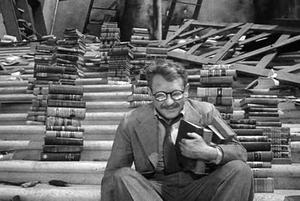Witness Mr. Henry Bemis, a charter member in the fraternity of dreamers, a bookish little man whose passion is the printed page, but who is conspired against by a bank president, and a wife, and a world full of tongue cluckers, and the unrelenting hands of the clock. In "Time Enough at Last," every bookworm's favorite Twilight Zone episode, Rod Serling introduces the character played by Burgess Meredith with those words. On Monday, I was inspired to watch the episode again for the zillionth time shortly after seeing a headline in Business Insider: "Wall Street is expecting the worst of the retail apocalypse this week."
In "Time Enough at Last," every bookworm's favorite Twilight Zone episode, Rod Serling introduces the character played by Burgess Meredith with those words. On Monday, I was inspired to watch the episode again for the zillionth time shortly after seeing a headline in Business Insider: "Wall Street is expecting the worst of the retail apocalypse this week."
The piece blended apocalyptic stats ("roughly 3,500 brick-and-mortar retail stores are expected to close over the first half of 2017.... Retail trade lost nearly 30,000 jobs from January through March") with pessimism ("analysts are not expecting to be impressed") and Warren Buffet's confession that he'd been "too dumb" to invest in Amazon early.
For perspective, I turned to a mid-April blog post--"Can Indie Bookstores Escape the Fate of Other Retail Outlets?"--by Lynn Rosen, co-owner of Open Book in Elkins Park, Pa. I'd bookmarked it as an excellent commentary on the April 15 New York Times article headlined "Is American Retail at a Historic Tipping Point?"
Rosen observed: "It is my hope that the independent bookstore may be immune from this fate.... With the help of the American Booksellers Association, the independent bookseller community got a head start on fighting back against the shrinkage of bricks-and-mortar retail sales. Over the last several years, the number of independent bookstores in the United States has been growing, and numbers indicate that the health of the industry is good.
"I hope I am not being overly optimistic in saying that I believe we can continue this upward trend, despite overall statistics about retail in the U.S. We booksellers will continue to create spaces that serve the communities in which they reside by providing personalized selling and events that reflect the make-up of the community. We have knowledgeable and passionate owners and employees, and, of course, we sell a product, the book (yes I know many object to calling it a product) that we hope our society finds to be indispensable."
Well said. Adaptation has been the key for indie survival. This isn't the question: "What do we do?" This is: "What do we do next?" And that made me think of Mr. Bemis.
In the Twilight Zone episode, based on a short story by Lynn Venable, Mr. Bemis is a dispirited bank teller who's called into his boss's office to be disciplined for reading David Copperfield when he should have been waiting on customers.
"Now, Mr. Bemis," the bank manager says imperiously. "I shall come to the point of this interview. I shall arrive via the following route, which is what constitutes an efficient member of this organization, vis-a-vis a bank teller who knows his job and performance, i.e. an organization man who functions within an organization. You, Mr. Bemis, do not function within the organization. you are neither an efficient bank teller nor a proficient employee.... You, Mr. Bemis, are a reader!"
"A reader?"
"A reader! A reader of books, magazines, periodicals, newspapers. I see you constantly going downstairs into the vault during your lunch hour. Ultimatum, Mr. Bemis! You will henceforth devote your time to your job and forget reading or you will find yourself outdoors on a park bench reading from morning till night for want of having a job. Do make myself perfectly clear?"
Poor Mr. Bemis has other issues, as those of you who've seen the episode know. His poor eyesight is trumped by his even poorer foresight, though he does have a brief moment of luck when he takes his lunch break in the vault just as (classic TV spoiler alert) a massive explosion turns the city above him into post-apocalyptic wreckage.
He may be the only survivor. Eventually Mr. Bemis makes his way to the ruins of the public library. Despite the surrounding carnage, this pleases him. (We may sympathize more than we should.) "All the books I want," he marvels. "The very best thing of all is there's time now. There's all the time I need and all the time I want."
But just as he is celebrating his good fortune, he accidentally shatters his glasses. The world becomes a blur. The last reader cannot read.
"That's not fair at all," he cries. "There was time now."
This is the moment when I lose sympathy for Mr. Bemis. It's his city. He lives there alone now. Even half-blind, he should be able to find his way to the ruins of a nearby Duane Reade or Walgreens (Isn't there one on every block?) and sift through the rubble for some high intensity reading glasses. Then head off in search of LensCrafters debris for even better options.
Adjust to circumstances, Bemis!
That is precisely what indie booksellers have had to do in preparation for this so-called retail apocalypse. Fairness had nothing to do with it. Bookselling, as Mr. Serling might put it, is "a dimension as vast as space and as timeless as infinity. It is the middle ground between science and superstition. It lies between the pit of man's fears and the summit of his knowledge. This is the dimension of imagination...." Even under the circumstances Mr. Bemis faces, a bookseller would have stopped whining and opted for a little post-apocalyptic resilience.

